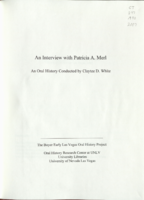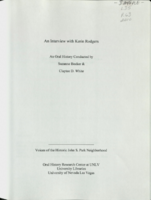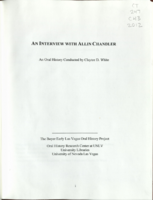Search the Special Collections and Archives Portal
Search Results

Transcript of interview with Pat Merl by Claytee White, October 9 & 28, 2008
Date
Archival Collection
Description
Patricia 'Pat' Merl plans for college did not materialized after graduation from a New Jersey high school in the late 1960s. Instead she took a receptionist job. The by the age of 19, it was her interest in dance classes that would lead her to audition to be a professional dancer for the Rockettes of Radio City Music Hall fame. Her days and weeks were filled with rigorous rehearsals and performances, but it was also an exciting time for a young and spirited girl. A side trip to Las Vegas in 1971 during her first ever vacation opened her to a new world of possibilities for a professional dancer. So without a job, she decides to remain in Las Vegas and explore the options. It became the beginning of a wide and varied career in the live entertainment industry. Pat's dancing resume includes working in many of the Las Vegas chorus lines of the 1970s, provides a flavor of what the work was like then and how it changed during the era. She includes the story of Frank Rosenthal and
Text

Transcript of interview with Steve Riback by Barbara Tabach, December 12, 2017
Date
Archival Collection
Description
Sgt. Steve Riback is a Detective Sergeant for the Las Vegas Metropolitan Police Department. He has been with the police force for nearly twenty years. On the night of the Route 91 Harvest festival shooting, he had just returned home shortly after 10pm. He had been on an overtime assignment at the Golden Knights hockey game at the T-Mobile prior to the shooting. When he was abruptly awaken by a call from his lieutenant, he was oblivious to the time and immediately rushed into action—contacted his squad members and sped to his station in northwest part of the city. He reflects on his overwhelming pride of the police that day, recalling what he heard on his police radio, seeing the rush of police cars being dispatched, and watching a body camera video later. Sgt. Riback’s squad was assigned to Spring Valley Hospital where they worked tirelessly to identify victims, both injured and deceased. His reflections stir the image of medical professionals and police officers urgently fusing together to handle the situation at hand. Riback shares a myriad of emotions, talks about the options available for officers to deal with their personal trauma, and how he explained to his eight-year-old why Daddy was crying. Riback is also known as the Kosher Cop and has authored a book, My Journey Home, about becoming an observant Orthodox Jewish officer and his struggle for the right to wear his beard and a yarmulke while on duty.
Text

Transcript of interview with Yvonne and Joni Fried by Barbara Tabach, February 17, 2016
Date
Archival Collection
Description
Yvonne Fried, M.D., and Joan “Joni” Fried are the daughters of Milton and Esther Fried, the founders of Freed’s Bakery—the standard to which all other Las Vegas bakeries are held. When the Fried family moved to Las Vegas in 1955, Joni was born here, the fifth child, of the entrepreneurial Milton, a musician by night, and his industrious wife Esther, who guided the family business. As Esther’s 2006 obituary reads: in 1959 the couple opened “a snack bar, selling donuts and Danish, at the Panorama Market on West Charleston, while Milt played in the show band at the Sahara Hotel in the evenings.” For Yvonne and Joni, this made for a rather busy and interesting household to grow up in. Their Jewish upbringing was at Temple Beth Sholom. Photo above honors the multi-generations of the Freed’s Bakery tradition: (L-R) Joni Fried, Anthony & Sarah Fusco (Joni’s daughter) Max Jacobson Fried (Yvonne’s son) holding his son Lucas, and (far right) is his wife Emilia.
Text

Transcript of interview with Dayvid Figler by Barbara Tabach, June 22, 2016
Date
Archival Collection
Description
Dayvid Figler (1967 - ) is the quiet boy who became an insightful and creative contributor to the local culture of Las Vegas. The oldest of Barbara and Meyer Figler?s three children, he was four years old when the family station wagon reached Las Vegas in 1971. They moved in with Uncle Izzy (aka Big Irish) Figler for a few months. Having the ?juice,? Dayvid?s father soon became a Pan dealer on the Strip. As the family grew, Barbara eventually immersed her energies in her children?s activities, Hadassah and Temple Beth Sholom. In this oral history, Dayvid also recalls his awkward, but incredibly interesting youth, his bar mitzvah at Temple Beth Sholom, and path to a successful career as a criminal defense attorney. He also talks about embracing Las Vegas as his home, owning a home in John S. Park neighborhood and mentions a number of literary depictions of Las Vegas that he admires. Dayvid describes growing up a ?casino kid? who lived in an apartment near the Riviera Hotel. This, in addition to his slight stature and academic brilliance, may have set him apart from many of his childhood peers. He graduated from Valley High School at the age of 16 and by the age of 23 he was a rising star in the legal world. He looks back with appreciation to his list of mentors who encouraged him along the way. Dayvid is also a local favorite as an essayist and poet. For a number of years he could be heard on KNPR/NPR. He has been a performer in hundreds of productions that featured his comic wit and writings, from Lollapalooza to Tom and Jerry?s on Maryland Parkway.
Text

Transcript of interview with Greg Goussak by Barbara Tabach, May 19, 2015
Date
Archival Collection
Description
Interview with Greg Goussak by Barbara Tabach on May 19, 2015. In this interview Goussak discusses his upbringing in Las Vegas, including his education in the Clark County School District and his experience with bussing to Sixth Grade Centers as the school district attempted to desegregate. As a teenager, he became involved with the B'nai B'rith Youth Organization through Temple Beth Sholom. Goussak talks about his mother's involvement with the Albert Einstein Hebrew Day School, which later moved and became the Dr. Miriam and Sheldon Adelson Educational Campus, and the kidnapping of Cary Sayegh. He then discusses finding his niche in accounting through taking an accounting course at UNLV as a high school student. Goussak talks about his education, career path as a controller in the gaming industry and public works projects, and becoming a professor.
Greg Goussak is a Las Vegas native, born January 1961, just after his parents moved to the city for his father's work as an accountant. His mother was a dedicated educator, who served throughout the city as a teacher and principal, including as the director of the Hebrew Day School in the 1970s. Greg's childhood was shaped by experiences with Las Vegas' sixth grade centers, challenges with scoliosis, and especially, involvement with B'nai B'rith Youth Organization (BBYO). In 1974, Greg helped start the city's new Aleph Zadik Aleph (AZA) chapter for BBYO, and his involvement with this youth organization became a formative part of his junior high and high school years. During this time, he became very involved with AZA at the regional, district and national levels, and made lifelong friends. As a high school student, Greg participated in UNLV's Early Studies Program, earning him college credit, and there he discovered his aptitude for accounting. He began tutoring fellow high school students in accounting, and thus, simultaneously discovered his passion for teaching. After earning his bachelor's degree in hospitality administration from UNLV in 1984, Greg got a job at Dunes Hotel and Casino, then under the leadership of Moe Shenker, working as an operations analyst. Over the next decade, Greg worked as a controller at several properties around town, including Nevada Palace, the Four Queens, Fitzgeralds, as well as a project on Boulder Highway. In 1992, seeking a reprieve from the gaming industry, Greg went back to UNLV to achieve his master's degree, in hotel administration. After graduating, he worked for Riviera Hotel and Casino, and established and oversaw their auditing department as well as box office. During this time, Greg met his wife Cynthia (Cindy) Riceberg, and the two were married in 1996. That same year, Greg took a position with Sigma Game, and soon after became Chief Financial Officer for Manpower Temporary Staffing. In 2002, deciding it was time to work for himself, he bought Haynes and Thomas Printers, which he owned and operated for the next eight years. Greg started teaching in 1989 as an adjunct professor in the William F. Harrah College of Hotel Administration at UNLV. In 2010, having finished his doctorate the year before, Greg assumed his first fulltime faculty position as an assistant professor at the University of Southern Nevada. The next year he was hired as an assistant professor at Ashford University, where he continues to teach today in the Forbes School of Business. Greg and Cindy have two daughters: Ariel, who is seventeen years old, and Alyssa, who is fourteen years old.
Text

Transcript of interview with Irwin Kishner by Claytee D. White, September 10, 2013
Date
Archival Collection
Description
Irwin Kishner (1933 ? 2017) was a noted real estate developer, attorney and longtime community leader. In this oral history interview conducted in 2013, he briefly shares his childhood growing up Jewish in Brighton Beach area of Brooklyn, New York. He often speaks of himself in the third person, as he brings to life his roots, his family?s move to Miami where he graduated from high school and the tale of his relocation to Las Vegas to work with his uncles Herman and Maury Kishner. He describes his entrance to Las Vegas as that of a bon vivant. And truly, Irwin, fell in love with the city from the moment he arrived in 1960. Irwin was a graduate of University of Florida (1954) and University of Miami Law School (1958). Both his daughters, Sharon and Joanna, were born in Las Vegas and he reminisces about becoming a Jewish bachelor father to them. In June 2013, shortly before this interview, Irwin celebrated his 80th birthday. He was a proud father, grandfather and energetic businessman who left an indelible mark on everyone he knew. As a developer, he was known for the Somerset Apartments, Somerset House Motel, Somerset Gardens apartment complex, and the Somerset Shopping Center. He enjoyed reflecting on the many community organizations he dedicated himself to, from the Las Vegas Convention and Visitors Authority to Opportunity Village to the original Las Vegas Rotary Club to the Community Concert Association?and that?s just to mention a few.
Text

Transcript of interview with Sharon Walker by Barbara Tabach, October 8, 2014
Date
Archival Collection
Description
Sharon Walker is a real estate investor, retired stockbroker and former loan officer. She was born on December 8, 1949 in Toledo, Ohio, and moved to Las Vegas with her family in 1963, where they started Walker Furniture, a store which they later sold to the Alterwitz family. Sharon's father, Julius Walker, was also in the casino business, becoming an owner of the El Cortez Hotel and Casino with Jackie Gaughan. Her mother, Anne Walker was a founding member of the first local Hadassah, The Women?s Zionist Organization. Sharon continues the family tradition of being active in Hadassah as well as being a Board Member of Jewish Family Service Agency. In November 2014 she was an honoree of Hadassah Leadership. In this interview, Sharon describes her adolescence in Las Vegas and the differences in culture as compared to her childhood in Toledo, Ohio. She also recalls the Walker Furniture business, her father?s careers, and her uncles Ed ?E? Walker and Lou ?Paddock? Walker.
Text

Transcript of interview with Kerin Scianna Rodgers by Suzanne Becker and Claytee D. White, February 7, 2009 and August 11 & 16, 2011
Date
Archival Collection
Description
Kerin Rodgers was born in 1936. She recounts her family history and stories of her youth growing up in Boston, MA, and shares how the family relocated to Seattle, WA in the mid-1940s. She talks about her enjoyment of theatrical arts and politics, and about being a resourceful divorced, single-mom and entrepreneur. In 1958 she opened a retail fashion store and modeling agency with a friend in Santa Monica, CA. Kerin had a knack for fashion and interior design that would assist her then and into the future. She also shares the story of arriving in Las Vegas as part of retail job with The Broadway stores in 1966—a two-week stint that seemed to have no ending. Her transition into Las Vegas included remarriage, a 1974 Keno win that enabled her to put down money on a home ( a house built by Paul Huffey) in the John S. Park neighborhood, and making close friends in the community. Her interview is sprinkled with tales of activities and personalities from the neighborhood's past and present. Kerin was involved with the Focus Youth House, speaks about First Fridays and art, as well as gives a perspective of police, criminal behaviors and changes in the neighborhood over the years. She hosted a local television show and enjoyed being a community activist.
Text

Transcript of interview with Hanford Searl by Dennis McBride, November 2, 1996
Date
Archival Collection
Description
Dennis McBride interviews Hanford Searl about a number of things: his being gay, his being gay in Las Vegas and other places, religious issues. Also, some information about working at the Las Vegas Review-Journal, and for Bob Brown at the Las Vegas Valley Times.
Text

Transcript of interview with Allin Chandler by Claytee White, February 5, 2013
Date
Archival Collection
Description
Another member of Rancho High School's first graduating class of 1962, Allin Chandler charted a course that took him from school football to a distinguished career as a teacher, principal, and Executive Director for the Clark County Association of School Administrators. Allin moved to Las Vegas from Texarkana, Texas with his mother in 1958, joining his father who was serving in the Air Force and stationed at Nellis AFB. Starting 9th grade at J.D. Smith Junior High and continuing on to Rancho the following year. Still actively involved in school athletics, Allin quickly discovered his talent and love for maths and science and eventually earned his degree in math and education. The stories Allin shares in this interview paint a vivid picture of how an intelligent and motivated young man can succeed - and how the class-free world of Las Vegas in the 1950s and 60s offered opportunities that he would never have had in class-conscious world of the South.
Text
